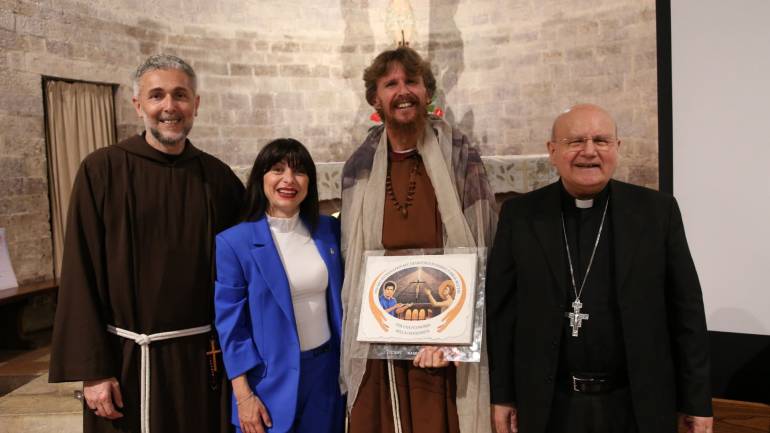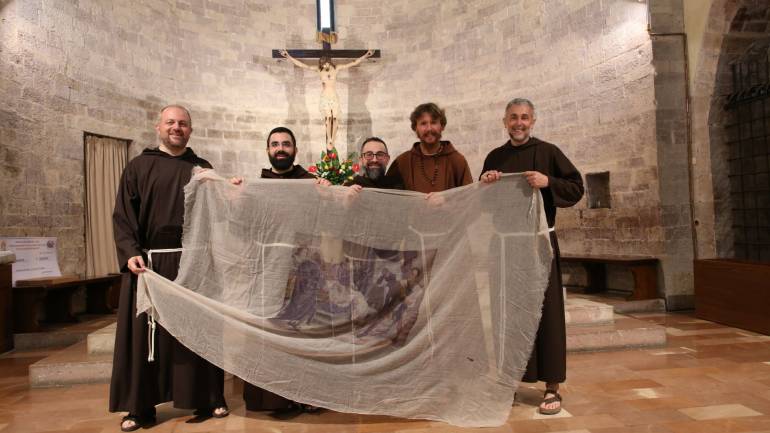A Graça do Trabalho: An Economy of Fraternity in Action

"St. Francis' act of giving up everything is not a rejection of the economy, but a foundation of it," Bishop Domenico Sorrentino.
The project “A Graça do Trabalho” or “The Grace of Work” has been honored with the Francesco d’Assisi and Carlo Acutis International Awards for its contribution to providing dignified work for indigenous youth and promoting Amazonian food culture.
International Recognition: The Francesco d’Assisi and Carlo Acutis Award for Fraternity Economy
The Amazonian cultures have recognized "A Graça do Trabalho," or "The Grace of Work," for its outstanding contribution to providing dignified work for indigenous youth and concurrently promoting healthier food options.
The initiative has received the international Francesco d'Assisi and Carlo Acutis Award for an Economy of Fraternity, a prestigious recognition that celebrates efforts made to create a more equitable and sustainable world.
The project not only won the award, but it also received funding worth 40,000 euros. The award package included an icon featuring the image of Saint Francis of Assisi and the Blessed Carlo Acutis, revered figures known for their commitment to the values of fraternity and charity.
Renowned entrepreneur Brunello Cucinelli also included a scarf in the award package, symbolizing the removal of excess and a return to life's essentials.
More Than Just an Award: A Symbol of Essential Life Values
The organizer selected the project from a pool of 33 entries, showcasing the diversity of innovative solutions people are developing worldwide. These submissions spanned five languages and came from 24 nations across the globe, demonstrating the universal relevance and importance of the award's goals.
The "Mihavotras," or "Saved Together" project, received the remaining 10,000 euros of the prize fund. This initiative, based in Madagascar, aims to support vulnerable women by facilitating the creation of cooperatives and providing them with much-needed employment opportunities.
A ceremony at the Sanctuary of the Church of Santa Maria Maggiore announced the award on May 18. Cardinal Sean O'Malley, the Archbishop of Boston, Monsignor Domenico Sorrentino, the bishop of the Diocese of Assisi, Nocera Umbra, Gualdo Tadino, and Foligno, and the Honorable Emanuele Prisco, the Undersecretary of State for the Interior, who represented the government, all attended the event.
Reflections on the Award: Aligning with Saint Francis's Teachings
During the event, Bishop Sorrentino reflected on the significance of the award and its alignment with the teachings of Saint Francis. "A grand gesture that sets a course in human history." "His act of giving up everything is not a rejection of the economy, but a refoundation of it."
Bishop Sorrentino emphasized the importance of not rejecting the economy but rather redefining it in a way that benefits all of society. " Francis explains that we must change our perspective on money, which is also the purpose of our award.
"This year, we received numerous project entries. Our award is more than just recognition; it's a school and a method of organized, participatory reflection.
It's almost like a laboratory for a new economic approach, which must include proper management of our shared home. "If not, we can't consider it as such." Bishop Sorrentino added.

"To touch the flesh of Christ, to give voice to his wounds in our discarded brothers and sisters," Cardinal O’Malley.
Award Ethos: A Call for a Different Economy
Cardinal O’Malley echoed these sentiments in his speech, recalling the fundamental ethos of the Award: "To touch the flesh of Christ, to give voice to his wounds in our discarded brothers and sisters."
For this reason, the prelate sees the need for "a different economy, one that gives life and does not kill, includes and does not exclude, humanizes and does not dehumanize, cares for creation and does not plunder it," according to Pope Francis.
Cardinal O'Malley congratulates the award recipients on their commendable initiative, "which transforms into a school for a different economy through its supporters, the various commissions, and the proposers of the projects."
"I encourage you to continue on this path of fraternity economics, " he said.
The Assisi Santuario della Spogliazione diocesan Foundation, in collaboration with the Diocese of Assisi, Nocera Umbra, Gualdo Tadino, and under the patronage of the National Committee, organized a three-day event that included the award ceremony.
Saint Francis of Assisi and Blessed Carlo Acutis' Legacy: Models for a New Kind of Economy
The Archbishop of Assisi launched the international award "Francis of Assisi and Carlo Acutis for an Economy of Fraternity" on October 10, 2020, during the Beatification of Carlo Acutis.
The goal of this award is to motivate and spur economic initiatives that benefit those in need, especially individuals under 35 and those living in the world's poorest areas. A commission thoroughly assesses each of these projects to ensure they truly benefit the underprivileged.
Pope Francis frequently states that Saint Francis of Assisi is a model for developing a new connection with the less fortunate. Saint Francis exemplified this by rejecting his father's wealth and choosing a life of reliance on providence. His choice marked the start of a new kind of economy that focused on everyone's welfare, particularly the poorest and most marginalized.
Encouraging New Economic Models in Challenging Times: A Symbol of Hope
Blessed Carlo Acutis, whose grave is in Assisi, embodied this "economy of fraternity" through his profound spirituality and care for the less fortunate. He believed that our love for God and others determines true beauty in God's eyes.
The international award "Francis of Assisi and Carlo Acutis, for an economy of brotherhood," stands as a symbol of hope in our current difficult times, which are characterized by a global pandemic and ongoing conflicts. It encourages the creation of new economic models rooted in holiness, beauty, and goodness.








